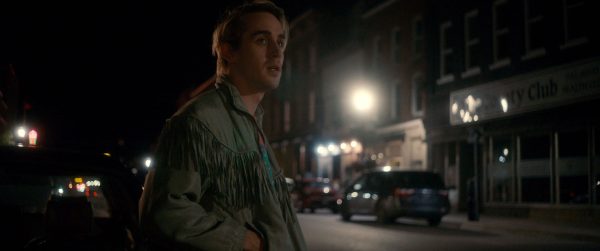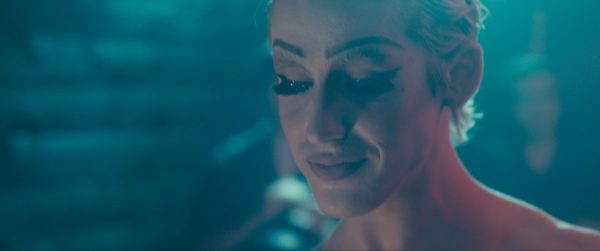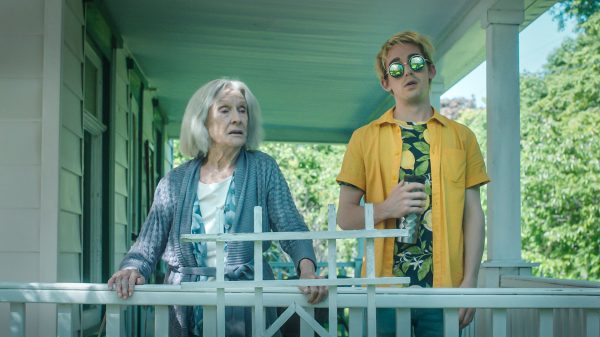‘Jump, Darling’ celebrates taking a leap of faith

“Jump, Darling” (2020 production, 2021 release). Cast: Thomas Duplessie, Cloris Leachman, Linda Kash, Andrew Bushell, Kwaku Adu-Poku, Katie Messina, Jayne Eastwood, Mark Caven, Sarah Camacho, Daniel Jun, Dylan Roberts. Director: Phil Connell. Screenplay: Phil Connell and Genevieve Scott (story editor). Web site. Trailer.
Life is full of opportunities, some great, some small. Many of us aspire to the former, but we often aren’t willing to do what it takes to reach those exalted summits. Whether that hesitancy is driven by fear, doubt, uncertainty, a lack of confidence or other considerations, we allow these self-imposed deterrents to hold us captive and stuck in place. Escaping these self-made prisons may take some effort, but we’ll never know what we’re missing until we try, initiatives that call us to make bold, courageous leaps of faith, as examined in the moving new comedy-drama, “Jump, Darling.”
Aspiring actor Russell Hill (Thomas Duplessie) is having difficulty getting on with his career. In fact, the Toronto-based performer has had so much trouble landing roles that he’s had to resort to taking a job as a drag queen at a local night spot, appearing under the stage name Fishy Falters. He’s not exactly thrilled to have had to accept this gig, but it’s been an even bigger disappointment to his partner, Justin (Andrew Bushell), an uptight, button-down corporate lawyer who sees Russell’s decision as an embarrassment – for both of them.
Disheartened by his lack of career progress and his partner’s unwelcome, unsolicited, deflating criticism, Russell impulsively decides to take an open-ended break from his current big city life. He packs a bag and embarks on a trip to rural Prince Edward County, Ontario to see his aging grandmother, Margaret (Cloris Leachman), a crusty but benign soul who adores her gay grandson. Margaret lives alone and is in failing health, though she’s fiercely independent and determined to stay put. That’s not always easy in light of the somewhat overbearing control freak tendencies of her daughter (and Russell’s mother), Eve (Linda Kash), who’s trying to relocate the matriarch to a retirement community.
Though surprised to see her grandson, Margaret is pleased to have him around (despite some questionable behavior on his part) to provide assistance and to run interference when Eve starts to become too intrusive and demanding. As for Russell himself, though, he’s somewhat adrift when it comes to the intentions behind his visit. He’s unsettled, nervous and directionless. He vacillates between staying and leaving. He alternates between feeling at ease and unduly anxious. And he appears to have resumed his ongoing, exasperating love/hate relationship with Eve. Yet, through it all, he takes comfort in Margaret’s company, particularly when she imparts some of her sage wisdom, much of which resonates strongly with him.

With the passage of time, Russell finally settles down enough to start exploring his options. He begins giving drag performances at a nearby small town gay bar, the only such club for miles, a venue that enables him to hone his skills. He also begins informally dating the club’s barback, Zachary (Kwaku Adu-Poku), an opportunity to discover whether there’s romance after Justin. But, despite these attempts at finding himself, these efforts aren’t fully satisfactory. In some ways, they feel like halfway measures.
It’s at this point that Margaret’s wisdom comes back into play. She cites a number of examples from her own life and those of other family members where they had to move past interim measures to achieve satisfaction in their respective undertakings. She tells Russell that sometimes such leaps of faith are necessary to fulfill one’s dreams, no matter what they may be. In fact, she hints that she’s considering one such leap for herself and that, if Russell wants to attain the success he’s seeking, he might want to metaphorically follow suit in his own particular way. Indeed, the time may have come for Russell to jump, darling.
Taking a leap of faith can be a frightening prospect. The uncertainty involved, not to mention the prospect of failure, can be extremely daunting. However, all too often, we fail to consider the fact that it just might work, too. And wouldn’t that be something!

It’s important to remember that how such a leap turns out depends heavily on how we view it. Are we afraid of what we’re considering? Or do we see it as the opening of a new door of opportunity? In either case, it comes down to the beliefs we hold about such a proposition, and that’s important to remember, for our beliefs dictate how matters unfold. This is the cornerstone principle of the conscious creation process, the philosophy that maintains we draw upon the power of these resources in manifesting the reality we experience.
In hoping for the best, we need to make sure that we conduct some judicious housekeeping when it comes to our beliefs. For example, if we allow fear-based beliefs into the mix, we significantly increase the chances of disappointment or stagnation, so those notions must be purged. At the same time, we must also affirm our beliefs in ourselves, especially when we know we can succeed at what the leap involves. To do otherwise would allow doubt to creep into the equation, which potentially could have the same effect as beliefs rooted in fear. But we can counteract this by bolstering our confidence, putting faith in ourselves and thereby reinforcing the likelihood of success.
Those measures all sound reasonable enough, yet it’s astounding how often we fall prey to the pitfalls that can trip us up. That’s important to recognize, because this illustrates just how powerful and persistent our beliefs can be, no matter what form they may take. In light of that, then, we must be cognizant of exactly what our beliefs are, because the foregoing illustrates how ingrained and influential they can be, as well as how difficult those conditions can be to overcome.

One of the potential hindrances that can keep us from taking a leap of faith has to do with the prospect of change. Moving into uncharted territory is often unnerving. In fact, many of us find change intimidating, even when we’re aware that it can ultimately leave us better off. Yet we should seek to make friends with change, particularly in our beliefs and especially for those associated with implementing alterations in our existence that we know are entirely attainable.
In Russell’s experience, for example, his exodus from his old life clearly represents a willingness to leave behind what no longer serves him. It reflects a healthy perspective on what change can enable. However, once he takes that initial leap of faith, he hesitates about taking any more, and that’s where his forward progress tends to stall. To his credit, he seems willing to take some baby steps, but are they enough? Based on how events unfold, it’s apparent he needs to engage in bolder measures to reach the fulfillment he seeks.
Change, by its nature, is at the core of one of conscious creation’s key principles, “everything is in a constant state of becoming.” However, if we resist it, we thwart the fulfillment of this concept, and leaps of faith often play an integral role in overcoming this issue. If Russell indeed hopes to fully understand and appreciate the value in this, he needs to take the required steps to avoid prolonged or permanent stagnation. This is particularly true for those of us who hope to live out our destiny, to truly live up to the potential we know we’re capable of.

Such are the themes sensitively and warmly explored in director Phil Connell’s debut feature, one that expertly fuses tender affection with tough love. While the narrative may meander a bit at times, its heartfelt sentiments and sage advice about being willing to take a leap of faith, no matter what the endeavor, will resonate with viewers who have taken – or who need to take – steps aimed at pushing the reset button in their lives. The film is particularly noteworthy as the final screen performance of Cloris Leachman, who is positively superb in the role of the insightful matriarch, capping off a storied career in an auspiciously fitting way, a portrayal sure to tug at the heart strings without being manipulative. This delightful offering holds universal appeal for anyone who has ever had to go through a difficult transition but manages to come out looking like a queen.
“Jump, Darling” has primarily been playing at film festivals thus far, but it has also been released on several streaming platforms in the picture’s native Canada. Given the quality of this offering, though, it definitely deserves wider release. Here’s hoping distributors are willing to take a leap of faith of their own where this one is concerned.
Sitting on the sidelines, playing it safe, may provide a sense of security, and that can indeed supply us with feelings of comfort and protection. But that’s not where any of the action is taking place; it’s all on the playing field, and the only way to participate is to get in the game, no matter what kind of undertaking is involved. That requires getting noticed and taking the kinds of chances needed to make that happen. But that can occur only if we believe we can be noticed. Are we willing and able to take that kind of leap? It depends on us. And, in any event, isn’t it better to try and find out than to never even attempt it?
Copyright © 2021, by Brent Marchant. All rights reserved.



